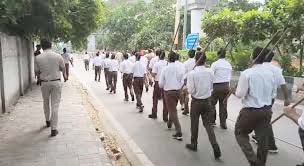
Special Correspondent: Rashtriya Swayamsevak Sangh (RSS) workers held a march called “Path Sanchalan” near Gate No. 7 and 8 of the university, an embodiment of secularism and pluralism, to celebrate their organisation’s 100th anniversary. Thousands of volunteers, dressed in traditional uniforms and carrying sticks, marched under tight Delhi Police security. This caused a lot of anger and unease among Jamia students, staff, and residents of the nearby localities.
Student groups like the Students’ Federation of India (SFI) and All India Students’ Association (AISA) have termed the march “discriminatory,” saying it “targeted” Jamia and was a clear example of “saffronisation” (imposing Hindutva ideology). Many secular faculty members saw it as a symbolic attack on the university’s secular identity, part of a planned conspiracy to weaken Jamia’s historic values. The march may seem like a small event, but historically and ideologically, it’s not just a physical act — it’s an intellectual move with effects that could last decades. Given its timing and location, it was clearly a provocative step, meant to undermine Jamia’s secular image and create fear and division among students.
In India’s intellectual and political history, Jamia Millia Islamia and the RSS are two parallel streams that emerged in the same era but flowed in opposite directions. Jamia was born in 1920 from the Indian freedom movement. Its founders — Maulana Mohammad Ali Jauhar, Hakim Ajmal Khan, Sheikhul Hind Mahmud Hasan, and Dr. Zakir Husain — made it a centre of intellectual and academic resistance against British rule. The institution represents a vision of India that rises above religious identity, embodying unity in diversity. Jamia has always embraced secularism and inclusive education, and its history is tied to great leaders like Gandhi, Nehru, and Maulana Azad, who saw it as an intellectual fortress against colonial oppression. Here, education is not just professional training but a process of thinking, questioning, reasoning and seeking justice.
Those who are making holes in the boat of this nation should not forget that they are the passengers on the same boat. By pleasing their masters, they may gain temporary benefits, but ultimately, the realisation will dawn on them that they have greatly harmed themselves. These words may seem old-fashioned, but such elements should remember that one day they will leave this world and be accountable to the One and the Only Almighty for every action, or the lack of it. What they are doing is robbing the collective rights of the nation. Do they think that on that day, the nation will forgive them?





